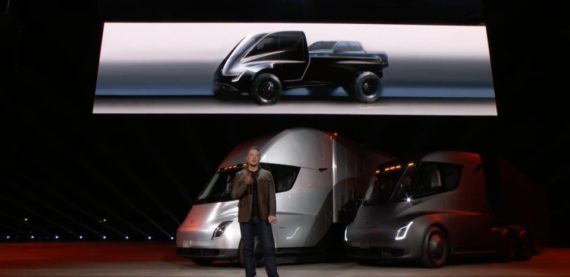
Tesla’s mission is to replace all internal combustion engines with electric powertrains. It began with sedans, but also has an SUV and has plans for semis and pickup trucks. By now, most of us know the advantages of electric vehicles — massive low-end torque and greatly reduced fuel and maintenance costs leading to a lower total cost of ownership. Zero emissions is just icing on the cake for many buyers.
During the introduction of the Tesla Semi last year, the company quietly slipped in a hint about what a Tesla pickup truck (it won’t be called the Model T) might look like. A graphic of an enormous pickup-like vehicle built on a Semi chassis showed a more conventional looking pickup truck in the load bed. Was it a glimpse of the Tesla pickup? Or was the vehicle carrying it the Tesla pickup?
The editors of Business Insider have raised a question this week about whether Tesla could actually crack the pickup truck market even if it builds a world class electric pickup truck. The issue is similar to the one Harley Davidson is facing as it contemplates how to expand its product lineup to include electric motorcycles — public perception. (Note that Business Insider has one of the highest ratios of negative:positive Tesla headlines of all the major media sites we track for our fresh new “Pravduh About Tesla” reports.)
For the Harley faithful, a machine from the famed Milwaukee manufacturer must have a V Twin internal combustion engine that makes the now famous “potato-potato” sound at idle. Both are an integral part of the brand Harley Davidson has created. The look and the sound convey a message to Harley fans. Will they still buy from Harley if those features are lacking?
Will pickup truck customers feel the same way? Ford, GM, and Chrysler have spent billions carefully crafting an image of pickup truck owners that has little to do with the actual performance of their vehicles. Just like the Marlboro Man, the pickup truck mystique taps into a deep subtext in American culture — the rugged individualists who conquered the Old West. Call it “cowboy culture,” if you like.
Like Harley Davidson, American pickups are for people who perceive themselves as bold, brawny, and brash. Owners like to think of themselves as iconoclasts — people who think for themselves and who are not part of the herd — even though every pickup truck looks pretty muck like every other pickup truck.
To buttress its case, Business Insider points to the Toyota Tundra, a pretty good pickup truck that has been sold in America for more than 20 years. Toyota has spent untold bundles of cash on flashy ads designed to convince the faithful that its pickup trucks are just as bold, just as brawny, and just as rugged as those from Ford, GM, and Chrysler.
Nevertheless, sales numbers tell the tale. “The Tundra is a great truck,” BI writes, “but in 2017 Toyota sold just over 115,000 in the US, while Ford sold almost 900,000 F-150s.” Between Chevy and GM, General Motors sold just as many pickups. Chrysler moved nearly 600,000 of its Ram 1500’s. Clearly, real pickup truck owners have turned their noses up at the thought of driving a Tundra.
BI says a Tesla pickup will face the same uphill struggle for market share as Toyota. In fact, it claims, the California (and Nevada) company will only find buyers at the top of the price range where people are willing to spend $100,000 or more just to park something different in the driveway.
That’s exactly what people said about the Model S and the Model X. But the success of the Model 3 has proven them all wrong. People continue to underestimate Tesla. As EV fans, we believe an electric pickup from Tesla would deal a crippling blow to the Big 2½, which rely on pickup trucks to stay afloat. Laissez les bon temps roulez!
